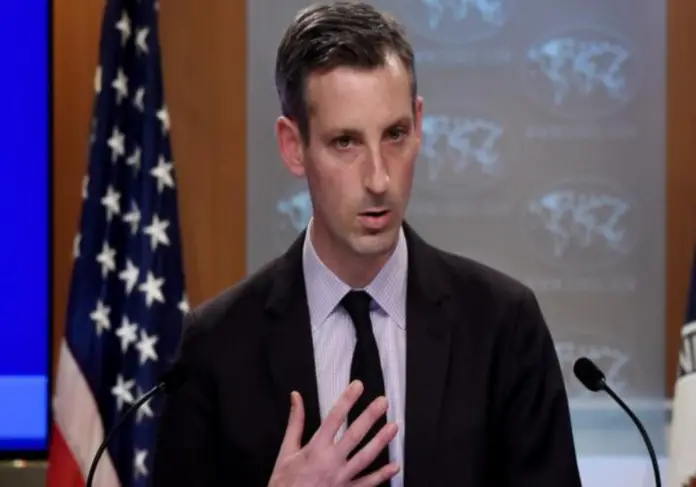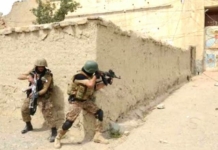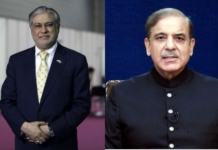The United States wants to see Pakistan in an economically sustainable position, State Department spokesperson Ned Price has said, noting that Islamabad was in negotiations with the International Monetary Fund (IMF) and other global financial institutions.
Asked about Pakistan’s dwindling foreign exchange reserves, he told reporters at his daily press briefing, “This is a challenge that we are attuned to.” “I know that Pakistan has been working with the IMF, with international financial institutions. We want to see Pakistan in an economically sustainable position,” Price added. “Those conversations, as I understand it, are ongoing. We are supportive where we can be of our Pakistani partners, but ultimately these are conversations between Pakistan and international financial institutions,” he said.
Pressed on the US response to Pakistan’s financial challenges, Price said, “These conversations with our Pakistani partners often do entail technical issues. Oftentimes these are addressed between the Department of the Treasury and our Pakistani partners. “But Pakistan’s macroeconomic stability is a topic of conversation between the Department of State and our counterparts, the White House, the Treasury Department, among others.”
Amid reports that the World Bank has delayed approval of loans worth $1.1 billion for Pakistan, the multilateral donor on Thursday termed the news as “unfounded”. Taking to his Twitter handle, World Bank’s Country Director for Pakistan Najy Benhassine said: “The press reports that refer to a World Bank decision to delay approval of potential Bank operations in Pakistan are unfounded.” Earlier, the media reports claimed the Washington-based lender has delayed the approval of two loans for Pakistan worth $1.1 billion until the next fiscal year.
However, Behassine made it clear that all the dates for approval of loans were already scheduled. “The tentative board approval dates of all of our proposed operations, as well as their amounts, are indicative, and the World Bank decides on the timing for sharing project proposals for board consideration following due process and based on the proposed projects’ readiness,” the World Bank official added.
A report suggested that a finance ministry source, on the condition of anonymity, told a British wire service that the approval of the World Bank loans has been pending since June. “The major issue is the circular debt management plan in the energy sector and tariff revision,” said the source. “These actions are pending on our side.” It mentioned that the World Bank and the finance ministry did not immediately respond to requests for comment. Pakistan’s economy has crumbled alongside a simmering political crisis, with the rupee plummeting and inflation at decades-high levels, while devastating floods and a major shortage of energy have piled on further pressure.
The South Asian nation’s enormous national debt – currently $274 billion, or nearly 90% of gross domestic product – and the endless effort to service it makes Pakistan particularly vulnerable to economic shocks. Foreign exchange reserves held by the State Bank of Pakistan (SBP) stand at $4.3 billion – their lowest level since February 2014 – while the country’s International Monetary Fund (IMF) bailout programme has been stalled since September 2022.
Meanwhile, State Minister for Finance and Revenue Ayesha Ghaus Pasha on Thursday highlighted that the government wants to continue its programme with International Monetary Fund (IMF) in such a way that the common man does not have to bear the burden of tough decisions to be made as per the Fund’s condition. Speaking to the media here after attending the Senate Standing Committee on Finance, Pasha said that the government’s economic team is having meetings with the Prime Minister to focus on its program with the IMF.
She said the Prime Minister is not in favor of taking tax measures across the board that could put an extra burden on the poor and common people. To a question, she did not give any date when to start talks with the IMF team but she said that the government was firm to go with the program after having a detailed workout. She said the government would try to convince the IMF about the worst situation in Pakistan after the disastrous floods last year. “The people are already suffering due to the disastrous flooding and they are not in a position to afford any further measures”.
Earlier, briefing the Senate Committee on Finance she informed that Pakistan is going through an extraordinary situation. A representative of the Pharmaceutical Manufacturing Association briefed the committee that the pharmaceutical industry has a potential of $6 billion. He said that this industry imports 93% of raw materials and the remaining 7 percent is also ordered from India, however, the LCs are 100% closed. He said that we have made advance payments but still the LCs are not open adding that all the banks are saying that they don’t have dollars.
Replying to a pharma representative, the State Minister said that you should not say such things on such a platform, adding that Pakistan is going through an extraordinary situation. Senate Standing Committee on Finance and Revenue met under the chairmanship of Senator Saleem Mandviwala. Pasha requested understanding for that fact that normal economic conditions cannot be provided yet and that we have inherited the current account deficit. She said that we have given instructions to the banks to open necessary Letters of Credit (LC’s). If LCs are not open, it does not mean that the country is going bankrupt, she added.







